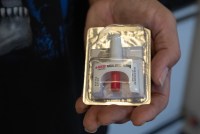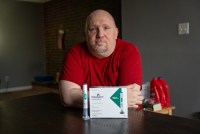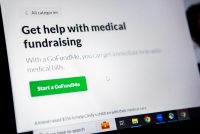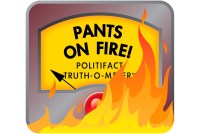Latest KFF Health News Stories
Nuevas normas de elegibilidad son un alivio financiero para casi 2 millones de personas en Medi-Cal
Este grupo se equiparará a los aproximadamente 12 millones de otros beneficiarios que no tienen límites de activos.
Early Detection May Help Kentucky Tamp Down Its Lung Cancer Crisis
After a decade of work, a Kentucky program launched to diagnose lung cancer earlier is beginning to change the prognosis for residents by catching tumors when they’re more treatable.
New Eligibility Rules Are a Financial Salve for Nearly 2 Million on Medi-Cal
Nearly 2 million Medi-Cal enrollees, mainly people who are aged, disabled, or in long-term care, can now accumulate savings and property without limitations and still qualify for the state’s health insurance program for low-income residents. They join an additional roughly 12 million enrollees who already had no asset limits.
California Prison Drug Overdoses Surge Again After Early Treatment Success
Drug overdose deaths in California state prisons rebounded to near record levels last year, a big setback for corrections officials who thought they were on the right track with medication-assisted treatment efforts. Prison officials and attorneys representing prisoners blame fentanyl.
¿Ofrecer vivienda gratis es atención médica? Programas de Medicaid dicen que sí
Estados están invirtiendo miles de millones de dólares en un experimento de atención médica de alto riesgo: utilizar fondos ya escasos de seguros de salud públicos para proporcionar vivienda a los estadounidenses más pobres y enfermos.
States Target Health Insurers’ ‘Prior Authorization’ Red Tape
Doctors, patients, and hospitals have railed for years about the prior authorization processes that health insurers use to decide whether they’ll pay for patients’ drugs or medical procedures. The Biden administration announced a crackdown in January, but some state lawmakers are looking to go further.
GoFundMe Has Become a Health Care Utility
Resorting to crowdfunding to pay medical bills has become so routine, in some cases health professionals recommend it.
For the first time, a jury has convicted a parent of a school shooter of charges related to the child’s crime, finding a mother in Michigan guilty of involuntary manslaughter and possibly opening a new legal avenue for gun control advocates. Meanwhile, as the Supreme Court prepares to hear a case challenging the FDA’s approval of the abortion drug mifepristone, a medical publisher has retracted some of the journal studies that lower-court judges relied on in their decisions. Alice Miranda Ollstein of Politico, Sarah Karlin-Smith of the Pink Sheet, and Rachana Pradhan of KFF Health News join KFF Health News’ Julie Rovner to discuss these issues and more. Plus, for “extra credit,” the panelists suggest health policy stories they read this week that they think you should read, too.
La FDA finalmente prohibiría peligroso químico en productos para alisar el cabello
El primer estudio que vinculó los alisadores de cabello con el cáncer de útero, publicado en 2022, encontró que el uso frecuente de estos químicos duplica con creces el peligro.
FDA’s Plan to Ban Hair Relaxer Chemical Called Too Little, Too Late
The FDA’s recent notice that it would move to ban formaldehyde in hair-straightening products comes more than a decade after researchers raised alarms about health risks. Scientists say a ban would still leave many dangerous chemicals in hair straighteners.
Cities Know That the Way Police Respond to Mental Crisis Calls Must Change. But How?
Cities are experimenting with new ways to meet the rapidly increasing demand for behavioral health crisis intervention, at a time when incidents of police shooting and killing people in mental health crisis have become painfully familiar.
Even in Bright-Blue California, Abortion Is on the Ballot
The race to replace the late Democratic Sen. Dianne Feinstein is in full swing in California. Although the state enshrined abortion rights into its constitution, the prospect of a national abortion ban has the candidates vying for a Senate seat putting a spotlight on reproductive rights. Or, at least the Democrats are. Steve Garvey, a […]
Colorado avanza con proyectos para conectar a trabajadores agrícolas con servicios de salud mental
Los proyectos de ley en consideración abordarían la creciente necesidad de tratar los problemas de salud mental en áreas rurales, que se han visto exacerbados por los impactos de la pandemia y el cambio climático.
Cerca de 10 millones ya perdieron Medicaid, y todavía faltan meses de purga
Medicaid y el Programa de Seguro de Salud Infantil crecieron hasta alcanzar un récord de 94 millones de inscritos durante la pandemia.
Colorado Moves to Connect Agricultural Workers With Mental Health Resources
Advocates say two bills under consideration could help migrant communities but that more needs to be done.
Halfway Through ‘Unwinding,’ Medicaid Enrollment Is Down About 10 Million
While more Medicaid beneficiaries have been purged in the span of a year than ever before, enrollment is on track to settle at pre-pandemic levels.
Is Housing Health Care? State Medicaid Programs Increasingly Say ‘Yes’
States are using their Medicaid programs to offer poor and sick people housing services, such as paying six months’ rent or helping hunt for apartments. The trend comes in response to a growing homelessness epidemic, but experts caution this may not be the best use of limited health care money.
Congressman Off-Base in Ad Claiming Fauci Shipped Covid to Montana Before the Pandemic
Facts don’t support claims by a likely Republican Senate candidate that a federal research laboratory in Montana infected bats with a coronavirus from China before the covid-19 outbreak.
Journalists Catch Up on Top Issues Facing 2024 Voters, From Obamacare to Opioids
KFF Health News and California Healthline staff made the rounds on national and local media this week to discuss their stories. Here’s a collection of their appearances.
Advocates Say a Practice Harms Disabled Children, Yet Congressional Action Is Stalled
In the photos, a 9-year-old boy with autism appears barricaded between cubbies and furniture stacked near the walls of a North Carolina classroom. His mother, Erin McGrail, said her son was physically restrained at least 14 times while in third grade at Morrisville Elementary School. She said she learned details of his seclusion only after […]





















